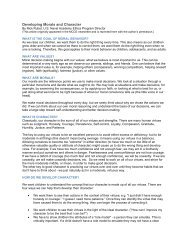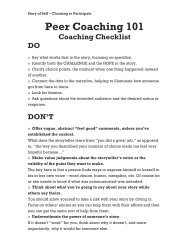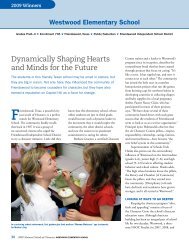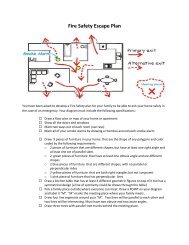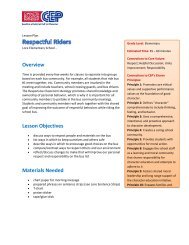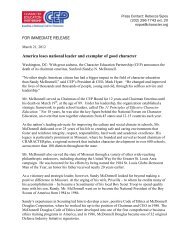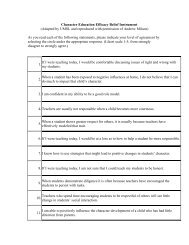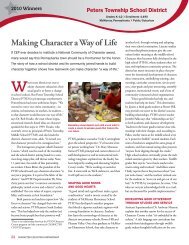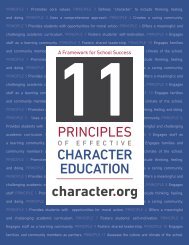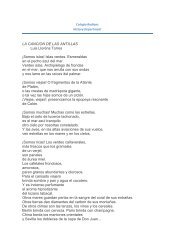What works in character education: A report for policy makers and
What works in character education: A report for policy makers and
What works in character education: A report for policy makers and
Create successful ePaper yourself
Turn your PDF publications into a flip-book with our unique Google optimized e-Paper software.
Schools can af<strong>for</strong>d to implement quality <strong>character</strong> <strong>education</strong>. It simply requires a mental<br />
shift of gears <strong>in</strong> how one approaches exist<strong>in</strong>g practice <strong>and</strong> content <strong>and</strong> a redirect<strong>in</strong>g of the focus<br />
of professional development activities.<br />
<strong>What</strong> are effective <strong>character</strong> <strong>education</strong> practices?<br />
This br<strong>in</strong>gs us to the <strong>What</strong> Works <strong>in</strong> Character Education (WWCE) <strong>report</strong>, an ef<strong>for</strong>t to<br />
uncover <strong>and</strong> synthesize exist<strong>in</strong>g scientific research on the effects of K-12 <strong>character</strong> <strong>education</strong>.<br />
Commissioned by the Character Education Partnership <strong>and</strong> funded by a grant from the John<br />
Templeton Foundation with support from Proctor & Gamble <strong>and</strong> the 3M Foundation, <strong>What</strong><br />
Works <strong>in</strong> Character Education research was conducted by the University of Missouri St. Louis.<br />
This <strong>report</strong> <strong>for</strong> <strong>policy</strong> <strong>makers</strong> is one of three com<strong>in</strong>g from the WWCE project. It addresses two<br />
issues: (1) what did we f<strong>in</strong>d out about effective <strong>character</strong> <strong>education</strong> practice? <strong>and</strong> (2) what more<br />
do we need to know about effective <strong>character</strong> <strong>education</strong> practice? A second <strong>report</strong> <strong>for</strong> educators<br />
summarizes best practices <strong>in</strong> <strong>character</strong> <strong>education</strong>. The last <strong>report</strong> details the research project that<br />
generated these conclusions.<br />
The <strong>What</strong> Works <strong>in</strong> Character Education Project<br />
In order to underst<strong>and</strong> what is known from scientific research about effective <strong>character</strong><br />
<strong>education</strong> practice, we began with the follow<strong>in</strong>g conceptual model of <strong>character</strong> <strong>education</strong>:<br />
• Character is psychological. The outcome of effective <strong>character</strong> <strong>education</strong> is the<br />
psychological development of students.<br />
• Character <strong>education</strong> targets a particular subset of child development, which we call<br />
<strong>character</strong>. Character is the composite of those psychological traits that impact the<br />
child’s capacity <strong>and</strong> tendency to be socially <strong>and</strong> personally responsible, ethical, <strong>and</strong><br />
self-managed.<br />
A Report <strong>for</strong> Policy Makers <strong>and</strong> Op<strong>in</strong>ion Leaders 4






